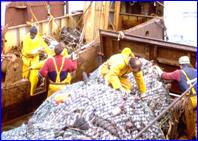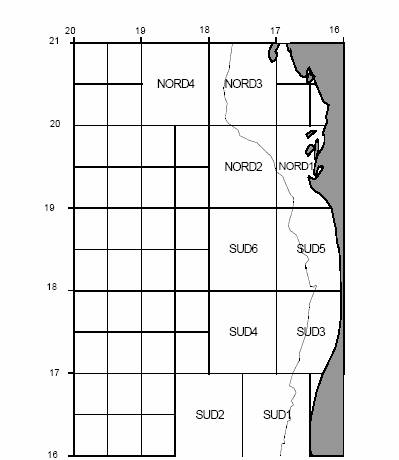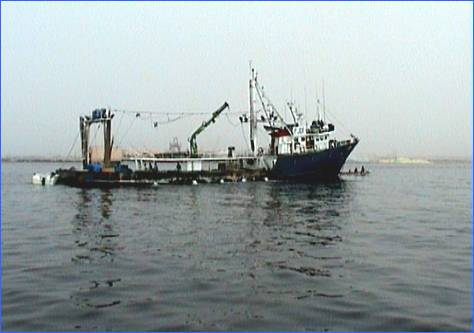Legal and Technical Fishing Framework

The Mauritanian fishing policy strategy is made of a mix of fishing rights, compulsory landing of most of the demersal catch, inspection of trans-shipped catches and the willingness to support domestic fish processing units.

Fishing eases (resources access rights) may be granted by the Mauritanian state to a foreign vessel intervening (or not) within a Fishing Agreement with another country.
These bilateral international treaties are regulating the vessel staying and their activities in the waters under Mauritanian jurisdiction for which the cash counterparts are collected by Mauritania .
Each type of industrial fishery has to follow particular specifications on allowed fishing areas, targeted species, legal sizes, by-catch levels, gear types, mesh sizes, engine power, etc. No vessel can fish in Mauritanian maritime waters without a license which is namely attributed to each ship.
Areas of limited and prohibited fishing are determined.
Commercial Fishing is authorized 12 miles (1988) off from a line between "Cap Blanc and Cap Timiris" in the North and off low tide line in the South of Cap Timiris. EEZ is of 200 nautical miles covering 234 000 km˛

For example restrictions about the minimum mesh size for nets are:
* Pelagic and shrimp trawls = 40 mm
* Demersal trawls = 70 mm
* Tuna purse net = 140 mm
* Surrounding seine = 20 mm
* Gill and trammel nets = 110 mm
In order to closely monitor the access to its halieutic resources, Mauritania has developed a scope of different license categories:
* Coastal fishing license (no dedicated fishing gear on board, no foreign vessels)
* Commercial fishing licenses (specific fishing gears) split in:
* Pelagic fishing license
* Demersal fishing license
To be noted that :
* Demersal fishing licenses are currently restricted to ships which already have such a fishing license as the fishing authorities are attempting to alleviate the commercial fishing impact on seabed (demersal and bento pelagic species) in order to let the fish stock replenish.
* However, demersal catch is encouraged through coastal fishing license.
* The demersal commercial fishing fleet essentially catches octopus (cephalopods).
* Some small freezing trawlers units (coastal fishing), where the fish is carefully selected, are also focused on sea bed species.
* All of these products are subject to a landing obligation.
Special fishing licenses such as:
* Tuna fishing
* Shrimp fishing
* Lobster fishing
* Black hake fishing
* Cephalopod fishing (restricted)
* Shell fish catch (currently almost unexploited).
The use of these licenses calls for various schemes (chartering, free licensing, partnering) which are valid for all foreign ships, whatever the type of license (but coastal fishing, as the ship shall be under Mauritanian flag).
However – due to current demersal and cephalopod fishing restrictions – those scheme mostly apply to pelagic and special fishing.
Foreign fishing vessel licensing conditions
* All fishing boats to be equipped with GPS-Argos
* Foreign vessels not allowed to fish in Mauritanian waters must stow fishing gear. (Art. 32).
(Ordinance No. 88-144 of 30/10/1988 adopting Maritime Fisheries Code)
* Chartering of foreign vessels by Nationals for fishing operations in Mauritanian waters allowed, according to halieutic available stocks.
* No vessel can fish in Mauritanian maritime waters without a licence. (Art. 19)
* Licence to be held on board. (Art. 20)
* Licence granted for maximum 12 months. (Art. 21)
* Licence conditions and forms set out by Ministerial Order. (Art. 24)
* Foreign fishing vessels to be registered before granting of licence; registration requires
technical and administrative information on the vessel, as well as information on fishery agreement at stake, licence specifications, controls and sanctions regarding the vessel. (Art. 17)
* Obligation to land demersal catches in Mauritania, unless derogation from Minister of fisheries; no derogation possible for vessels fishing cephalopods. (Art. 10)
* Fishing operations for scientific researches to be authorized by Minister
* Name, number and letters of vessel identification to be displayed. (Art. 26)
* Licence application forms must mention:
1. Name and technical characteristics of the vessel;
2. Name and nationality of the master,
3. Nationality and port of registry of the vessel;
4. Description of activities planned (species targeted, fishing gear, fishing period, landing areas and destination of catch);
5. Name, address, capacity and powers of local representative of the owner, and other information required by Minister for Fisheries. (Art. 7)
* Modifications to licensed foreign fishing vessel has to be notified to Minister for fisheries within 30 days. (Art. 9)
* Chartering of foreign vessels fishing:
1. demersal species and cephalopods requires exceptional authorization by Decree of Minister, and has to provide the Mauritanian part with minimum 35% of the value of the catch; and
2. shellfish and pelagic species to be allowed for temporary periods by Minister of fisheries with minimum 21% for Mauritanian;
3. rate of authorized by-catches for cephalopods, demersal species and shellfish < 10% of authorized species, and
4. (d) for pelagic species < 3%. (Art. 10)
* Areas of limited and prohibited fishing determined. (Art. 12)
* Minimum mesh size of nets:
Gill and trammel nets = 110 mm.;
Pelagic and shrimp trawls = 40 mm.;
Demersal trawls = 70 mm.;
Tuna purse net = 140 mm.;
Surrounding seine = 20 mm.;
Derogation authorized by Minister for Fisheries. (Art. 13)
* Minimum size of fish listed by species. (Art. 14)
* Stowage of fishing gear by unauthorized foreign vessels to be done in prescribed way. (Art. 16)
* Radio call sign from IUT to be displayed on upper part of superstructure so as to be visible from the air with black or white characters and in determined size according to vessel dimensions. (Art.17)
* Master of industrial fishing vessel, when required by Minister or a relevant Control Authority, must allow Mauritanian scientific observers on board and provide them with all necessary facilities and assistance. (Art. 18)
* Minimum 35% of the crew on board including master and officers, must have Mauritanian nationality, except ministerial derogation. (Art. 19) (Decree No. 89-100 of 26 July 1989, for enforcement of Ordinance adopting the Maritime Fisheries Code)
* Vessel must have regular certificate of compliance with international conventions related to security and protection of marine environment. (Law No. 95-009 of 31 January 1995 adopting Code of Merchant Shipping, arts. 151 and 158)
Foreign fishing vessel logbook and reporting requirements
* Statistical data and form for catch reports to be supplied to relevant department of fisheries
(Art. 30)
* Scientific data collected during fishing operations for scientific research be sent to Minister of Fisheries. (Art. 26)
* Master and owner of the vessel to maintain updated logbook (art. 31)
* Specific requirements regarding tuna vessels.
* Vessel must report through determined radio and frequency, time and location of entry and departure in Mauritanian waters, as well as position at regular intervals, cargo and relevant documents, and catches. (Art. 33) (Ordinance No. 88-144 of 30 October 1988 adopting Maritime Fisheries Code)
* Master of the vessel to maintain catch report on a daily basis to be transmitted to the relevant authority, at the end of every tide or by radio, during the course of fishing operations, if required. (Art. 10) (Decree No. 89-100 of 26 July 1989 for enforcement of Ordinance adopting the Maritime Fisheries Code)



 - °
- °

